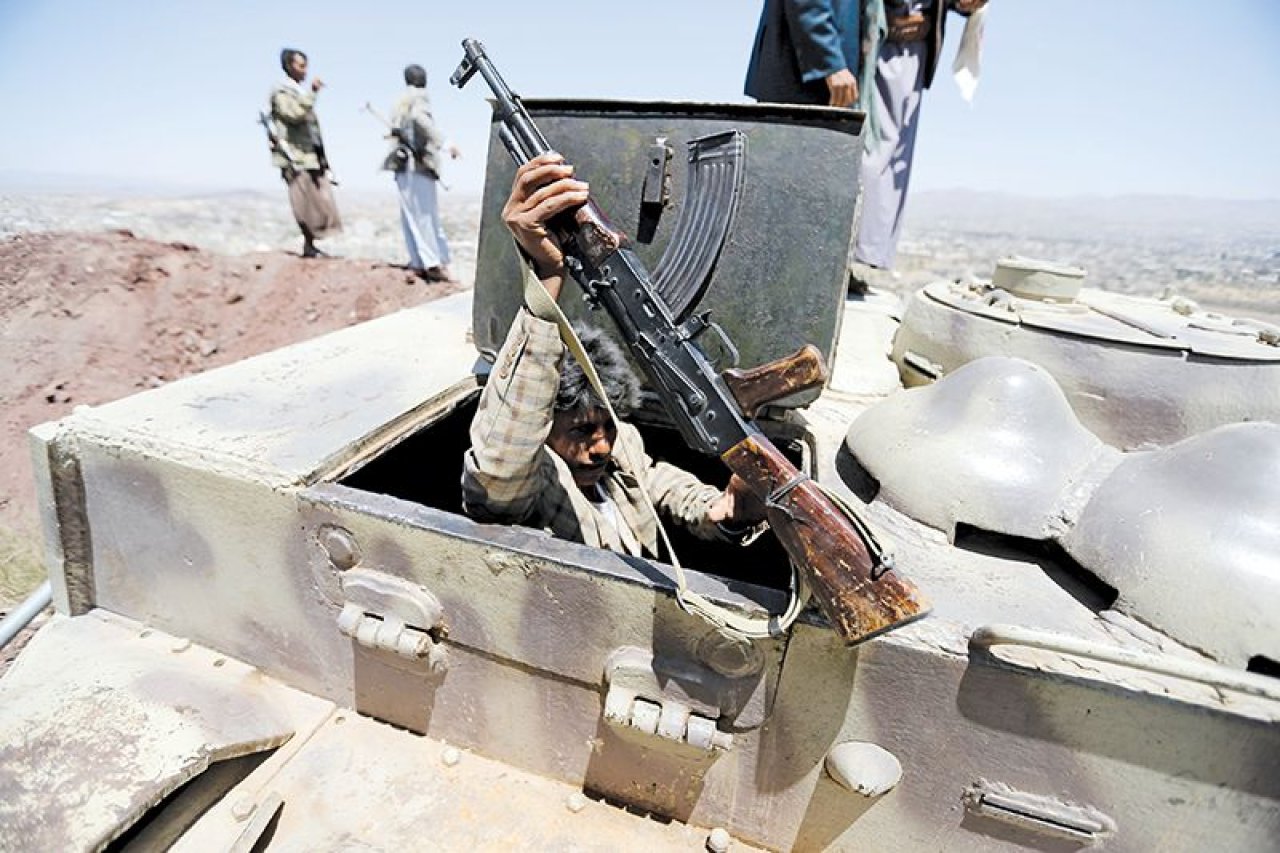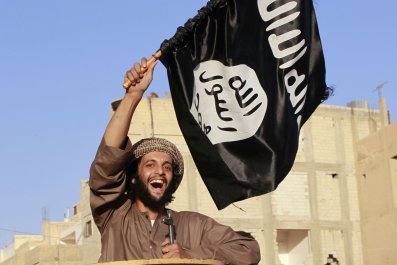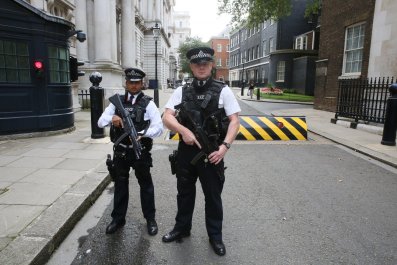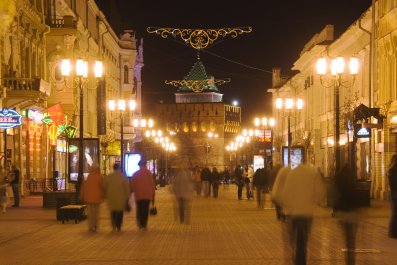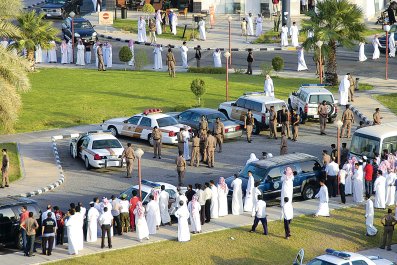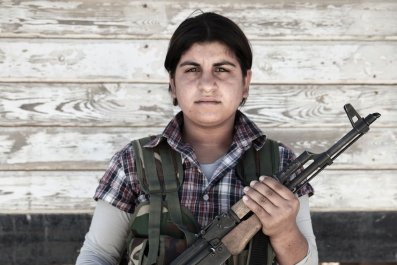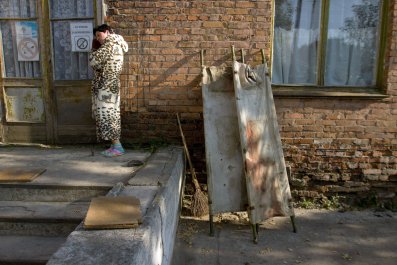It's a game of Whac-a-Mole. While America is concentrating on the war against ISIS and other Sunni terrorists in Iraq and Syria, another strategically located Arab country, Yemen, is being eaten alive by a Shiite group closely affiliated with Iran and Hezbollah.
The Shiite group, known as the Houthis, now controls the Yemeni capital, Sanaa. Its fighters are guarding all government buildings, and its ubiquitous bumper stickers, announcing "Death to America, death to Israel, a curse on the Jews, victory to Islam," are everywhere, from streets signs to Kalashnikov rifle butts dangling from the shoulders of Houthi fighters.
Yemen's neighbors, including Saudi Arabia, are afraid that a Houthi takeover of Yemen would put an Iranian ally on their doorstep. Others in the region say that the simultaneous military advances of Yemen's Zaydi Shiites, led by the Houthis, also have troubling strategic implications.
If the Houthis march to the southwesternmost tip of Yemen, they and their Iranian allies would gain control of Bab el-Mandeb, the narrow sea passage between the Gulf of Aden and the Red Sea where the bulk of all naval commerce between Europe and Asia, and 30 percent of the world's oil, passes daily.
"I have no doubt that the Houthis, backed by Iran, are planning to go south, and eventually to Bab el-Mandeb," a Western diplomat who has long followed Yemen said recently, speaking on condition of anonymity. "It's just a question of time." If Iran gets to control this most strategic of straits, it will be able to shape trade and military policies not only in the region but way beyond.
But Iran's allies are not there yet. The Houthis' Sunni rivals in Yemen, Al-Qaeda in the Arabian Peninsula (AQAP), are not giving up without a fight. A twin AQAP suicide attack on October 9, apparently aimed at marchers in a Houthi show of force in Sanaa's Tahrir Square, killed at least 67. It appears the shaky calm created by a fragile Yemeni political deal brokered by Yemen's Arab neighbors, Western allies and the United Nations is quickly unraveling.
Yemen's descent into an armed conflict between Sunni jihadis and extremists affiliated with Iran was predictable. The U.N. secretary-general's special envoy to Yemen, Jamal Benomar, for one, has repeatedly alerted the Security Council for many months that "spoilers" were working hard to bring down Yemen's delicate transition to democracy.
"Recent developments in Yemen are seriously threatening the only peaceful negotiated transition in the context of the Arab Spring," Benomar told me shortly after returning from one of his frequent trips to the country and neighboring capitals. "What is happening in the country is a spectacular development that will have serious implications for Yemen as we know it, and for the entire region."
Perhaps one reason his endless warnings to the Security Council have mostly gone unheeded was the feeling in Western capitals that Yemen, unlike so many other corners of the Arab Middle East and North Africa, seemed to be on the right track.
The unrest that has shaken the Arab world since 2011, as the Arab Spring's clamor for democracy felled one long-established despotic strongman after another, reached Yemen early on. Educated young men and women demanding that ordinary Yemenis be given a seat at the governing table led to nationwide demonstrations. By November 2011, the Yemeni leader, Ali Abdullah Saleh, who had ruled with an iron fist for 22 years, was driven from power. His former deputy, Abd-Rabbu Mansour Hadi, was made president in his place.
Backed by neighboring Saudi Arabia and its Arab allies, and urged on by Western countries and the U.N., Hadi launched a political process that aimed to be inclusive and was meant to overcome Yemen's myriad tribal and sectarian enmities. A ten-month national dialogue conference was concluded with an agreement to build a federal democratic state. It contained unprecedented provisions, such as guaranteeing women 30 percent representation in the Yemeni parliament.
It all looked promising. In June, President Barack Obama commended Yemen on its progress toward openness and democracy as a "model" for the rest of the region. "You look at a country like Yemen—a very impoverished country and one that has its own sectarian or ethnic divisions—there, we do have a committed partner in President Hadi and his government," Obama said.
"In Yemen, a wide-ranging national dialogue" might have taken a long time, Obama said, but it "helped to give people a sense that there is a legitimate political outlet for grievances that they may have." That process, he said, had helped enormously in countering the Al-Qaeda terrorists that had taken residence in Yemen "without putting large numbers of U.S. troops on the ground."
Last month, Obama again cited Yemen as a place where America can combat Islamist terrorists while political reform was setting the country on the right path toward stability. The "strategy of taking out terrorists who threaten us, while supporting partners on the front lines, is one that we have successfully pursued in Yemen and Somalia for years," he said.
He spoke too soon. While his national security advisers were turning their attention to the fight against the newest threat on the terror horizon: the Islamic State, the group commonly known as ISIS.
The ISIS threat was considered so serious in Washington that the White House was even considering cooperating with its old nemesis Iran, and its allies, to fight the murderous Sunni extremist group, which had captured vast areas of Iraq and Syria. To that end, administration officials recently dismissed Turkish demands to topple the Iranian-backed Syrian president, Bashar Assad, to concentrate on the war against ISIS.
Perhaps sensing this development, Abdel-Malek al-Houthi, a scion of his Yemeni Shiite clan, decided to make his move. On September 21, as the Houthis signed yet another U.N.-brokered deal with President Hadi to advance the power-sharing transition process, they occupied two-thirds of Sanaa, putting roadblocks across the capital and forcefully occupying all government buildings.
A week ago, the Houthis nixed a move by Hadi to name a new prime minister, Ahmed Awad bin Mubarak, whom the president thought would be acceptable to them. The Western diplomat who has been watching Yemen for years explained that with their newfound powers, the Houthis would rather have their own "puppet" as prime minister than someone appointed by Hadi. He sensed the hand of Saleh, the ousted Yemeni strongman, behind the Houthi coup.
For nearly three years, Saleh has stewed in his juices, ruing his agreement to cede power. He stood down to escape the fate of former Egyptian president Hosni Mobarak, who was put on trial after being driven from power. But since his ousting, Saleh has become close to Assad, who, unlike Mubarak, has managed to hold on to power, despite the bloody Syrian civil war.
In addition to cozying up to Assad, Saleh, who like the Houthis is a Zaydi Shiite, has made deals with Iran and Hezbollah, its Lebanese-based proxy. Pulling strings through his son and members of the Yemeni military who had remained loyal to him, Saleh also repaired his ties with the Houthis, the clan that as president he had oppressed for decades.
Saleh and the Houthis played upon the political frustrations of the Shiites that had been bottled up for years, helping Iran to widen its zone of influence in the process. "Iran is helping the Shiite Muslim rebels in Yemen and elements who are interested in dividing up the country with it, so as to widen its influence," Gerald Feierstein, the former American ambassador in Yemen, told the London-based Pan-Arab newspaper Al-Hayat recently.
The Zaydis—Yemen's Shiites—have been oppressed by successive rulers in Sanaa since 1962, when their nearly 1,000-year rule over the country came to an end. Iran's Revolutionary Guards and members of Hezbollah are now training Houthi fighters, hoping to ride their political frustration toward their aim of expanding Iran's Shiite Crescent far beyond its current reach in Iraq, Syria and Lebanon.
So now the Al-Qaeda affiliate based in Yemen, which has long found itself in America's crosshairs, has a new cause to rally around. With renewed clashes between Yemen's two most extreme forces, and with the West busy elsewhere, any hope of making Yemen a model Arab federal republic has sharply dimmed.



